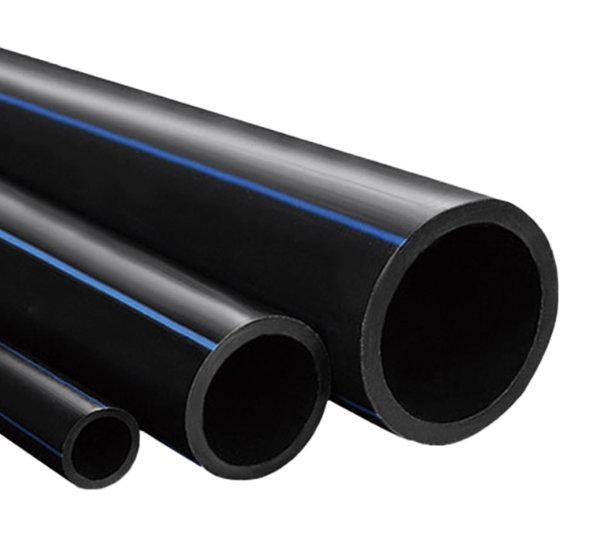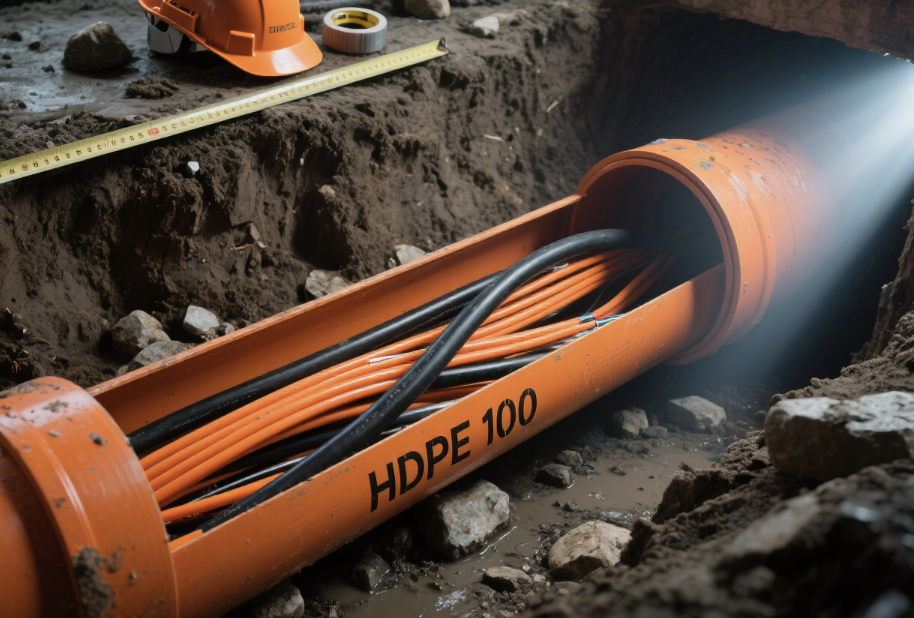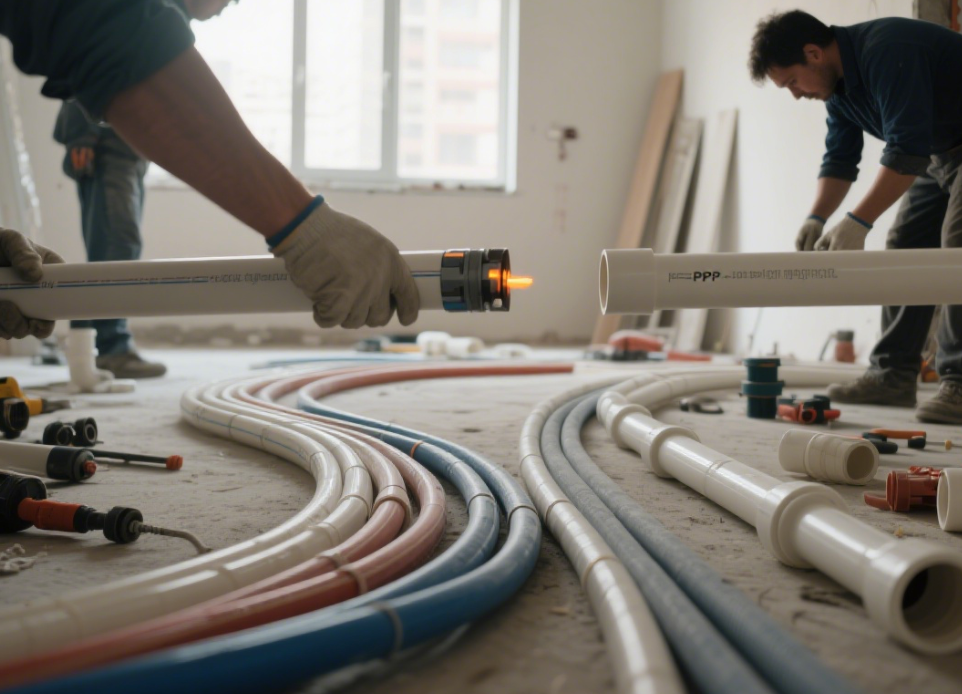
High-Density Polyethylene (HDPE) pipes have emerged as a cornerstone in modern pipeline systems, offering unparalleled flexibility, strength, and sustainability for fluid and gas transportation across industries. From municipal water supply systems to industrial chemical transportation and underground cable protection, HDPE pipes deliver an ideal combination of durability, corrosion resistance, and cost-efficiency.
As a leading HDPE pipe manufacturer and supplier, Akan Enterprise Group (Shanghai) Co., Ltd. leverages advanced technology and strict quality management to deliver HDPE pipe solutions aligned with evolving infrastructure demands and global sustainability goals. Understanding what an HDPE pipe is, how it works, and why it outperforms traditional piping materials will help businesses, contractors, and municipalities make informed decisions for future-ready infrastructure.
Introduction to HDPE Pipe
An HDPE pipe is a highly versatile, flexible, durable, and lightweight pipeline constructed from high - density polyethylene resin. It is specifically engineered for the safe and efficient transfer of fluids and gases across a wide range of applications. The unique properties of HDPE pipes make them an ideal choice for modern infrastructure and industrial needs.
Key Characteristics of HDPE Pipes
1.Seamless Leak - Proof Connections
HDPE pipes are renowned for their seamless and leak - proof connections, achieved through advanced heat fusion methods. This process involves heating the pipe ends and then joining them under pressure, creating a bond that is as strong as the pipe itself. Unlike traditional pipes that rely on mechanical joints or adhesives, HDPE pipes eliminate the risk of leaks and seepage, ensuring long - term reliability and reducing maintenance costs.
2.Long Operational Life
HDPE pipes have an exceptional operational lifespan, often exceeding 50 years. This longevity is attributed to their molecular structure and the absence of weak points such as joints or seams. The pipes are resistant to abrasion, UV degradation, and general wear and tear, making them a cost - effective and sustainable solution for long - term infrastructure projects.
3. Resistance to Chemical and Environmental Stress
HDPE pipes are highly resistant to a wide range of chemicals, including acids, alkalis, and solvents. This makes them ideal for use in challenging environments such as industrial processing plants, mining operations, and agricultural irrigation systems.

Properties and Advantages of HDPE Pipes
Flexibility and Lightweight
HDPE pipes are known for their exceptional flexibility. This remarkable flexibility significantly reduces the need for additional fittings in curved installations, simplifying the overall construction process. For example, in applications such as underground utility installations or pipeline routing around obstacles, HDPE pipes can be easily maneuvered without the need for multiple joints or bends. This not only saves on material costs but also reduces installation time and labor.
Moreover, HDPE pipes are lightweight, making them easier to transport, handle, and install compared to traditional materials like steel or concrete. Their lightweight nature means that they can be more easily lifted and maneuvered by construction crews, reducing the need for heavy machinery and lowering overall installation costs. This combination of flexibility and lightweight construction makes HDPE pipes an ideal choice for a wide range of applications, from municipal water supply systems to agricultural irrigation networks.
Corrosion and Chemical Resistance
HDPE pipes exhibit outstanding resistance to a wide range of corrosive substances, making them highly durable in harsh environments. They can withstand:
Acidic and alkaline substances: HDPE pipes are resistant to both acidic and alkaline chemicals, making them suitable for applications involving industrial effluents, chemical processing, and wastewater treatment.
Saline and corrosive soils: In areas with high soil salinity or corrosive soil conditions, HDPE pipes remain unaffected, ensuring long - term performance without degradation.
Electrochemical corrosion: Unlike metal pipes, HDPE pipes do not suffer from electrochemical corrosion, which is a common issue in underground installations where different metals come into contact with each other and the soil.
These properties make HDPE pipes ideal for use in harsh industrial and underground environments, where traditional materials would quickly deteriorate. Their resistance to corrosion and chemical attack ensures that they maintain their structural integrity and performance over extended periods, reducing maintenance and replacement costs.
Impact and Stress Resistance
HDPE pipes are designed to withstand a variety of physical stresses, making them highly resilient in dynamic environments. They can handle:
Ground movements: HDPE pipes are flexible enough to absorb ground movements without cracking or breaking. This makes them ideal for areas prone to soil settlement or other forms of ground displacement.
Seismic activities: In regions with seismic activity, HDPE pipes can withstand the stresses imposed by earthquakes, ensuring the continuity of critical infrastructure such as water and sewage systems.
High - pressure surges (water hammer): HDPE pipes can handle sudden pressure surges, commonly known as water hammer, without bursting or deforming. This is crucial in applications involving high - pressure fluid transfer, such as industrial processing plants and municipal water supply systems.
Their ability to withstand these stresses ensures that HDPE pipes remain functional and reliable under challenging conditions, reducing the risk of pipeline failure and associated costs.
Smooth Interior and Hydraulic Efficiency
HDPE pipes have a smooth interior surface, which significantly enhances their hydraulic efficiency. They have:
Friction factor: This low friction factor means that water or other fluids flow more easily through HDPE pipes compared to pipes made from materials like steel, concrete, or PVC.
Higher flow capacity: Due to their smooth interior, HDPE pipes can handle higher flow rates with less energy loss. This translates to improved hydraulic performance and reduced pumping costs in applications such as water supply, irrigation, and industrial fluid transfer.
The smooth interior also reduces the risk of sediment buildup and biofouling, ensuring consistent flow rates and long - term performance. This makes HDPE pipes an ideal choice for applications where maintaining high flow capacity is critical.
Environmentally Friendly
HDPE pipes are an environmentally friendly option for several reasons:
100% recyclable: HDPE pipes can be fully recycled at the end of their service life, reducing waste and promoting sustainability.
No toxic leaching: Unlike some traditional materials, HDPE pipes do not leach toxic substances into the soil or water, ensuring environmental safety and compliance with environmental regulations.
Lower carbon footprint: The manufacturing and installation processes for HDPE pipes generally have a lower carbon footprint compared to materials like steel or concrete. This is due to the lower energy requirements for production and the lighter weight of HDPE pipes, which reduces transportation emissions.
Their eco - friendly properties make HDPE pipes a responsible choice for modern infrastructure projects, aligning with global efforts to reduce environmental impact and promote sustainable development.
Applications of HDPE Pipes
Water Supply and Distribution
HDPE pipes play a crucial role in the water supply and distribution sector, offering reliable and efficient solutions for both municipal and rural areas. They are extensively used for:
Municipal and rural potable water delivery: HDPE pipes are ideal for transporting clean drinking water due to their corrosion resistance, smooth interior, and ability to maintain water quality without leaching harmful substances. Their long lifespan ensures that water supply systems remain functional for decades with minimal maintenance.
Replacement of aging iron and concrete pipelines: Many existing water supply systems rely on outdated iron or concrete pipes that are prone to corrosion, leaks, and high maintenance costs. HDPE pipes provide a cost-effective and durable alternative for replacing these aging pipelines, reducing water loss and improving overall system efficiency.
Sewage and Drainage Systems
HDPE pipes are widely used in sewage and drainage systems due to their ability to withstand harsh conditions and prevent leaks. Their applications include:
Gravity and pressure sewer lines: HDPE pipes are suitable for both gravity - fed and pressure - driven sewer systems. Their seamless connections and corrosion resistance ensure that wastewater is transported efficiently without the risk of leaks or contamination.
Stormwater drainage: HDPE pipes are used for stormwater drainage systems to manage runoff from heavy rainfall and prevent flooding. Their smooth interior and high flow capacity allow for efficient water flow, while their durability ensures long - term performance in outdoor environments.
Gas Distribution
The gas distribution industry relies on HDPE pipes for their excellent leak - proof properties and durability. HDPE pipes are used for: Natural gas and LPG pipelines: HDPE pipes are ideal for transporting natural gas and liquefied petroleum gas (LPG) due to their seamless connections and resistance to corrosion and environmental stress. The use of advanced fusion techniques ensures that joints are as strong as the pipe itself, eliminating the risk of gas leaks and ensuring safe and reliable gas distribution.
Industrial Applications
HDPE pipes are highly versatile and find extensive use in various industrial applications, including:
Chemical transport: HDPE pipes are resistant to a wide range of chemicals, making them suitable for transporting acids, alkalis, and other corrosive substances in industrial plants. Their durability ensures long - term performance without degradation.
Slurry and abrasive fluid conveyance in mining: In the mining industry, HDPE pipes are used to transport slurries and abrasive fluids. Their flexibility and resistance to abrasion make them ideal for handling these challenging materials, reducing wear and tear compared to traditional materials like steel.
Process water pipelines: HDPE pipes are used for process water pipelines in industrial facilities, ensuring efficient water flow and maintaining water quality. Their smooth interior and low friction factor enhance hydraulic efficiency, reducing pumping costs.
Irrigation and Agriculture
HDPE pipes are a popular choice in the agricultural sector for their flexibility, durability, and ability to improve water efficiency. They are used for:
Drip and sprinkler systems: HDPE pipes are used in drip and sprinkler irrigation systems to deliver water directly to crops. Their flexibility allows for easy installation in various terrains, while their durability ensures long - term performance. HDPE pipes help reduce water wastage and improve irrigation efficiency.
High - efficiency irrigation networks: HDPE pipes are used to build high - efficiency irrigation networks that optimize water usage and reduce environmental impact. Their smooth interior and low friction factor ensure efficient water flow, while their corrosion resistance ensures long - term reliability.
Cable Protection
HDPE pipes are also used for protecting cables and conduits due to their durability and flexibility. They are used for: Conduits for fiber optics and power cables: HDPE pipes provide a protective conduit for fiber optic and power cables, ensuring their integrity and longevity. Their flexibility allows for easy installation in various environments, while their resistance to environmental stress protects the cables from damage.
Firefighting Systems
HDPE pipes play a critical role in firefighting systems by providing a reliable and efficient water supply. They are used for: Underground water supply for firefighting networks: HDPE pipes are used to transport water to firefighting networks, ensuring a reliable supply in emergency situations. Their leak - proof connections and durability ensure that the water supply remains intact, even under high - pressure conditions.

HDPE Pipeline Four Core Types
1.HDPE Water Supply Pipe: food-grade PE100, rated ≥1.6 MPa, corrosion-free, safe for potable water.
2.HDPE Gas Pipe: SDR11, slow-crack-growth resistant, ultra-low leakage, ideal for city gas grids.
3.HDPE Same-Floor Drain: zero-slope siphon, fits bathroom slabs without lowering, leak-proof.
4.HDPE Silent Structured-Wall Pipe: triple-layer with air cavity, noise reduction ≥15 dB, perfect for hotels & hospitals.
Sizes
At Akan Enterprise Group, we offer a comprehensive range of HDPE pipe sizes to meet diverse project requirements. Our HDPE pipes are supplied in:
Standard Lengths: Available in standard lengths of 6, 9, 12 meters, customers can customize according to actual conditions, these pipes are suitable for a wide range of applications, from small - scale installations to large - scale infrastructure projects.
Coiled Lengths: For small - diameter pipes, we also offer coiled lengths up to 500 meters. Coiled HDPE pipes are particularly useful for applications where long, continuous runs are required, such as irrigation systems, gas distribution networks, and small - diameter water supply lines. The coiled format reduces the need for multiple joints, simplifies installation, and lowers labor costs.
Our extensive range of sizes and formats ensures that we can provide the right solution for every project, whether it requires short - length pipes for localized installations or long - coiled pipes for extensive networks.
Frequently Asked Questions About HDPE Pipes
What is an HDPE pipe made of?
HDPE pipes are made from high-density polyethylene resin, often with carbon black for UV resistance.
Are HDPE pipes safe for drinking water?
Yes, they use food-grade PE materials, making them safe for potable water delivery.
How long do HDPE pipes last?
Properly installed HDPE pipes can last 50+ years.
Can HDPE pipes handle high pressure?
Yes, depending on SDR and wall thickness, HDPE pipes can handle high-pressure fluids and gases.
Do HDPE pipes leak?
No, when installed with heat fusion methods, HDPE pipe joints are leak-free.
Conclusion
HDPE pipes represent the future of efficient, durable, and sustainable pipeline systems across water, gas, and industrial applications. With properties such as flexibility, leak-proof joints, corrosion resistance, and a long operational lifespan, HDPE pipes are a superior alternative to traditional piping systems.
Akan Enterprise Group (Shanghai) Co., Ltd. offers advanced HDPE pipe solutions manufactured to stringent quality standards, ensuring your projects meet modern performance and sustainability requirements. If you are planning infrastructure, municipal, industrial, or agricultural projects, consider transitioning to HDPE pipes to ensure efficiency, environmental compliance, and cost-effectiveness over the system’s lifecycle.
Related Articles

Is PPR Pipe Better Than PEX?
Diving into the world of plumbing, you might wonder: Is PPR pipe better than PEX? It’s a common question, and we’re here to help you navigate the differences. From material and cost to performance and application, this guide will give you the insights you need to make an informed choice.

Polygon Pipe, Updating Strategy and Setting Off Again!
1. Akan Group (Polygon Pipe) JourneyAkan New Building Materials was established in 2000, and initially entered the PPR international market. In 2006, it began to build a domestic marketing network and expand the Polygon Pipe brand. Since around 2010, the company has entered a decade of rapid develop
CONTACT
Get in Touch With Us


